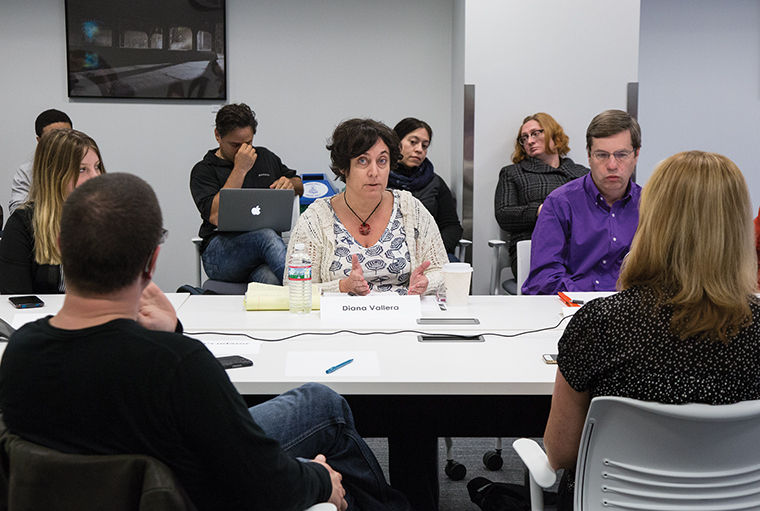P-Fac’s 13 labor law allegations passed back to college
Diana Vallera, an adjunct professor in the Photography Department and president of P-Fac, discussed concerns about the college at the Strategic Planning Steering Committee’s final meeting on April 20, 2015.
February 29, 2016
Columbia’s part-time faculty union, P-Fac, filed 13 labor law disputes that the Chicago office of the National Labor Relations Board deferred for settlement by the contractual grievance and arbitration process with the college, according to a November NLRB ruling.
If the disputes are not resolved, the college must agree to “prompt, final and binding arbitration,” the NLRB order states.
The NLRB will monitor the situation and check in with the college and P-Fac approximately every 90 days to determine whether progress is being made toward a settlement of the labor law allegations.
Michael Persoon, P-Fac’s attorney at Despres, Schwartz & Geoghegan, Ltd., said this is a “big win” for P-Fac because the ruling is a message to the college that it needs to start working with P-Fac to better restore collective bargaining.
Cara Birch, a spokeswoman for the college, said in a Feb. 25 emailed statement that the NLRB did not rule on the merits of any of the deferred claims asserted by P-Fac, nor did the NLRB advance any of P-Fac’s allegations.
Birch said the ruling decided the deferred claims were subject to the grievance process, and that P-Fac should use that process.
The 13 allegations of labor law violations include claims such as “unilaterally” reduced pay, retaliating against adjuncts because of their union activities, assigning courses “at will” to people outside the bargaining unit, canceling courses prior to the normal registration cycle and increasing class sizes, adding to adjuncts’ workload.
Other allegations include suspended stipends for adjuncts, assigning classes to full-time staff who are not authorized to teach under P-Fac’s collective bargaining agreement, assigning adjuncts who have fewer than 51 accumulated hours instead of adjuncts with more than 51 hours and hiring lecturers without showing a “true need.”
Persoon said these disputes are an example of what happens when there is a bad collective bargaining relationship between schools and their unions, and he hopes the college’s relationship with P-Fac will improve in the future.
P-Fac also accuses the college of paying “stipends” for independent study and directed study that do not follow the payment schedule required under P-Fac’s contract, and changing the times and days of certain classes without notifying unit members who wanted to offer to teach those classes.
The union also said the college assigned courses previously taught by unit members to full-time faculty, lecturers and full-time staff, and failed to recognize the seniority of many adjuncts.
Persoon declined to comment on any individual circumstances or allegations.
“[Columbia needs to] deal with us as the law requires that they deal with their collective bargaining partner,” Persoon said.
Diana Vallera, an adjunct professor in the Photography Department and president of P-Fac could not be reached for comment, as of press time.








